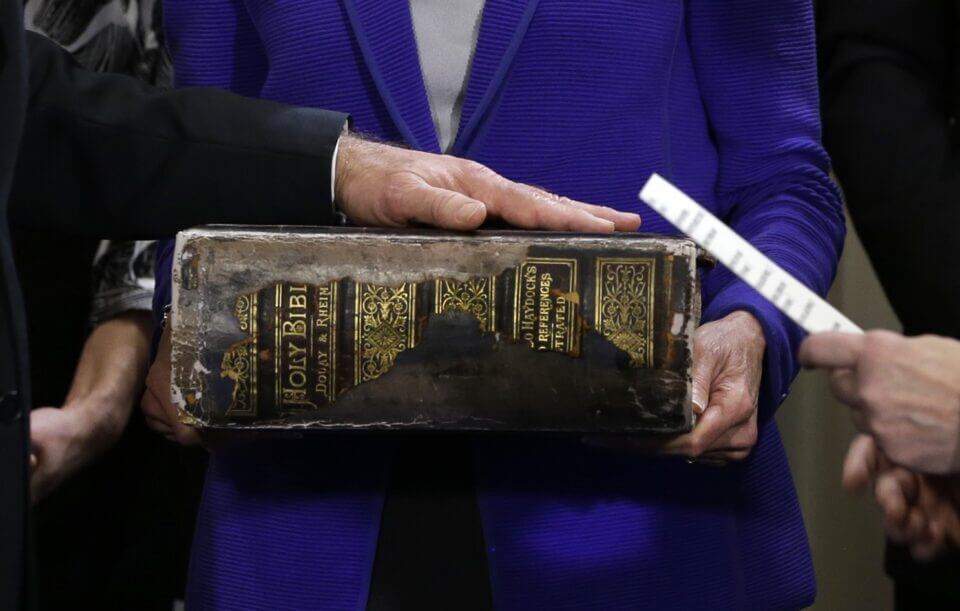
“While laws do not and absolutely should not regulate a politician’s religious practices, the time and place for these practices is not when taking an oath of office.”
Simultaneously holding a religious text and promising to defend the Constitution of the United States are at odds, two opposing actions. Yet, we see it all the time, most recently with the slate of new leaders taking office as a result of the 2020 elections.
People like to imagine that the contemporary Christian Bible only has messages of love and compassion, instructions for leading a sound, moral life. This is inaccurate. The Bible is a collection of copies of ancient texts that condemn people to death and suffering, that condone slavery, that oppress people, and that demand perfect obedience toward impossible-to-follow, often inhumane commandments.
The Constitution is certainly flawed itself. (It has also needed a complete overhaul for some time.) The Constitution, in the words of Melissa Harris-Perry, is basically a document that says, “maybe possibly all white men with money are equal in a few kind of ways and maybe they can get a government [together].” Indeed, the Constitution codified Black women, Black men, and Black children as not even being full persons. Basic recognition as humans deserving of constitutional protections came to women, to Native Americans, and even to children well over a century after the founding of the United States. In the immediate aftermath, the American Revolution only replaced one out-of-touch group of rulers with another.
On the other hand, the Constitution does effectively call for separation of church and state, for free speech, and for anti-authoritarian governments. And it does not mention any religion or any God(s). The 27 Amendments to the Constitution have also—mostly—fostered positive steps in the long arc toward actualized freedom.
And, yet, before people officially assume an appointed or elected governmental office, they promise to speak the truth and to uphold the Constitution at all costs, before anything else. They do this while holding the Bible, in most cases. Holding the Bible is so common that one sometimes thinks to do so is required by law. It is so common that holding the Bible is effectively—in practice—required, especially in a nation that still holds feelings of distrust and contempt toward non-theists and toward Jews, Muslims, and followers of other religions. Congresswoman Marjorie Taylor Greene even recently suggested that Congresswoman Ilhan Omar’s and Congresswoman Rashida Tlaib’s swearing-in ceremonies were illegitimate because they each opted to hold a Quran.
While laws do not and absolutely should not regulate a politician’s religious practices, the time and place for these practices is not when taking an oath of office. In a nation that has a secular constitution and mandated freedom of religion with no state interference, why is it legal to hold or touch anything theistic during such ceremonies? Indeed, the Bible, with its demands to submit to rulers, stands against what most of us—apart from some Christian Nationalists—in the United States value about our democracy. This is a point that lawyer and writer Andrew L. Seidel persuasively and correctly argues in his 2019 book The Founding Myth: Why Christian Nationalism is Un-American.
The rhetorical, symbolic implications of holding any religious text while also promising to defend the United States above all are enormous. It is more than theatre (or just symbolism). Such rituals of civil religion (also called, civic religion) very specifically and publicly wed religious doctrines and the nation’s legal doctrines. Officeholders are made to have dual loyalties. Even if only unconsciously, such ceremonies instruct political leaders to consider religious doctrines included in unspoken portion of their oaths. Given that the Bible is most commonly used (and given that Christians are currently the majority), such rituals also tell Christians that their hopes and fears, in a way, are equally important to the positions articulated by the Constitution.
Instead of physically holding or touching a religious text, politicians should hold the Constitution—one of those pocket-sized Constitutions would be perfect! Think of the difference it would make. Holding the Constitution while promising loyalty to its standards. Simple. This would make it unmistakable and unambiguous to all that the allegiances of those empowered to protect and defend the United States rest solely with the Constitution of the United States.
Although some might argue that oath-takers could hold the United States flag, a flag does not say anything itself. People in the United States have an odd attachment to the nation’s flag, a flag that is ultimately only multi-colored cloth.
While I am arguing that holding a religious text during an oath should be banned (and while we are at it, we should also ban the practice before someone speaks in court), I am absolutely not suggesting this should extend to bans on any kind of religious head coverings or jewelry or anything else that is part of a politician’s everyday wardrobe.
Andrew Joseph Pegoda (@AJP_PhD) holds a PhD in history and teaches women’s, gender, and sexuality studies; religious studies; and English at the University of Houston. Previous writings can be found at The Washington Post, Time, The Houston Chronicle, and The Conversation.










